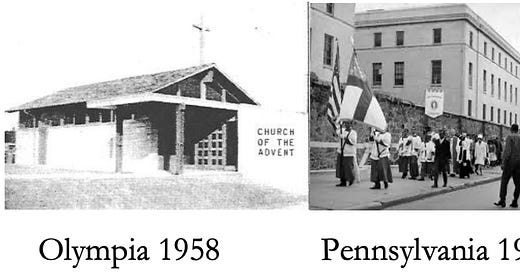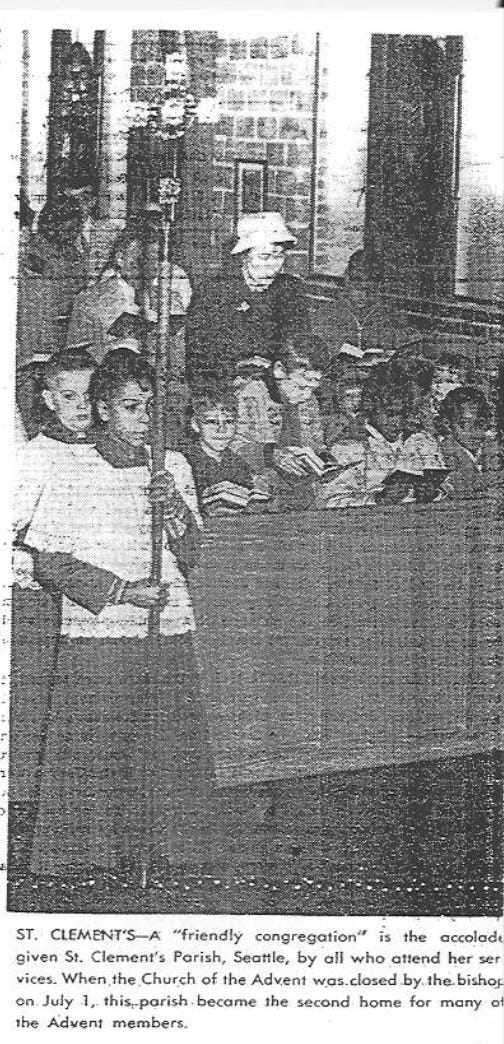Sister Michelle and I just finished saying Morning Prayer. When we got onto Zoom I said, “I’ve been thinking about two of the church’s actions, both showed purity of heart, one showed wisdom.” Before we began Morning Prayer she commented on how long the psalms were for today. There’s a section of Psalm 109 that the lectionary allows us to skip. So the temptation is always there to shorten things a bit. But we decided some time ago to never do that. Saying the difficult psalms is necessary for the soul’s health – ours and that of the whole church.
Olympia and Pennsylvania
A definition of sin offered by Richard Holloway (one-time Presiding Bishop of Scotland) is "a wrongly directed effort; a good drive that fails to find the right object; a good thing in itself that is done to excess." (Seven to Flee, Seven to Follow, 1986).
In 1965 I was a Candidate for Holy Orders in the Diocese of Pennsylvania and a member of CORE (the Congress of Racial Equality – one of the big four civil rights groups of that time). Our new bishop, Robert DeWitt had involved the church in a dispute over the segregation taking place at Girard College, a boy’s school in Philadelphia. That and similar actions infuriated some in the diocese. The bishop began his episcopacy with a few rough years. And that continued until he retired. Still, he lead Episcopalians as we joined the NAACP, CORE, and others in demonstrations around the walls of the college. Several years later the college finally ended its segregation policy.
A few years before that in the Diocese of Olympia, driven by the same mandate to integrate institutions, closed the Church of the Advent, its only African American parish.. The bishop referred to it as “ a racially segregated church.” The Urban League called the action an “outstanding step in race relations in Seattle… a fine example of de-segregation.” A number of Advent people ended up at St. Clement’s Church where Sister Michelle and I now worship. St. Clement’s describes itself as “An Anglo Catholic with an African American Heritage.” You can still hear grumblings about how the diocese treated the people of the Church of the Advent.
I believe both actions came from a purity of heart. Though looking back on it we might question whether the Olympia decision was rooted in wisdom. Sometimes we are driven by the wisdom of the age rather than the wisdom of the Holy Spirit.
Psalms 101 and 109
Psalm 101 begins with this lovely verse.
I will sing of mercy and justice; *
to you, O LORD, will I sing praises
I will strive to follow a blameless course;
oh, when will you come to me? *
I will walk with sincerity of heart within my house.
The psalms moves on from such purity to this,
I will soon destroy all the wicked in the land
Sounds a lot like our time doesn’t it?
I understand “mercy and justice” and you don’t. So, now I want to harm you. We can see it in the culture of grievance and resentment. Some work at proclaiming themselves the greater victim as though victimhood indicates moral vision. It’s the kind of thinking that brings Judas to betray Our Lord.
Then we came to Psalm 109 and verses 5 – 19 that our liturgical experts would allow us to skip. If you skip such verses you miss wisdom. The omitted verses include.
Let his children be waifs and beggars; *
let them be driven from the ruins of their homes. …
Let there be no one to show him kindness, *
and none to pity his fatherless children. …
Let his descendants be destroyed, *
and his name be blotted out in the next generation.
Nasty stuff.
When we come to verse 15 we discover what all that rage is about.
Because he did not remember to show mercy, *
but persecuted the poor and needy
and sought to kill the brokenhearted.
It sounds like me some years ago. And yes, even now on occasion. Again, can you see Judas in it? Can you see what was at least in part a purity of heart? I look at a number of the resolutions coming to General Convention and there’s the stink of sulfur and the heat of hellfire.
Mother Julia Gatta wrote about those parts of the psalms, “They reveal us to ourselves: they exhibit our most hateful thoughts and sinister motives, which we usually keep under wraps. One way or another Scripture tells the truth. Here it holds a mirror up to us, unmasking the ugly side of human nature. We pray the imprecatory psalms with humility, convicted of sin personally and as a species.” (Life in Christ)
Purity of heart needs wisdom
Bishop Holloway saw wisdom. As “The coming together of the other six gifts; wholeness.” Most contemporary books on the spiritual life speak of spiritual maturity.’
I’m still drawing on Richard Holloway’s understanding in seeing the seven gifts. (See Fill All Things: The Dynamics of Spirituality in the Parish Church)
· Fear (awe). I'd understand it as fear that you will not have the life you could have; the life God wants for you. It is as opposed to a life that is not for "the good" or that is trivial. This is the "fear that establishes proportions and recognizes consequences" and may lead “to a realistic, rueful … almost humorous awareness of our true state."
· Piety (affection). “A kind of fondness or love, a recognition of what you owe the land that bred you,” gratitude for the love, forgiveness and understanding one receives.
· Knowledge. A capacity to accept paradox, to hold things in balance, to see more completely. It is the knowledge of God and the dynamics of awe and affection.
· Courage (fortitude). Closing the gap between belief and action “by reaching beyond themselves to Christ,” rather than “by pulling Christ towards them and adapting him to their own uses.” Standing fast even though you want to run. Especially needed in moral life, the world of ideas, and in personal relations.
· Counsel (guidance). An openness to the Holy Spirit; openness to an energy for good that comes from beyond ourselves. It is related to developing a capacity for listening and an inner silence.
· Understanding. The gift of balance, an awareness of the situation. It is "knowing when to celebrate and when to lament." This is self knowledge. It is seeing the world rightly ‑‑ that the creation is good, that God is encountered through it.
· Wisdom. The coming together of the other six gifts; wholeness. Most contemporary books on the spiritual life speak of spiritual maturity.
There is also Paul's understanding of what God is doing in our lives, e.g. in Ephesians that we are to grow into the full stature of Christ; that the graces and practices necessary for that growth are humility, gentleness, patience, forbearance born of love, eagerness to maintain unity in the bond of peace, truthfulness mediated in love, mutual kindness, tenderheartedness and forgiveness; and in Galatians that the fruit of the spirit is love, joy, peace, patience, kindness, generosity, faithfulness, gentleness and self-control.
So, what was lacking in Olympia’s decision? Maybe it was knowledge and understanding. Maybe humility, patience and self-control. All discernment comes clearer as the years pass. And “New occasions teach new duties, Time makes ancient good uncouth.”
Pray for wisdom and when you pray, say all of the psalm.
This abides,
Robert





